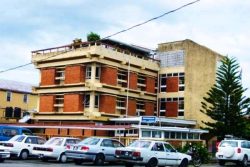The National Toshaos Council (NTC) has advertised for a consultant to assist it with Free, Prior and Informed Consent (FPIC) consultations with indigenous communities.
In the last Sunday Stabroek, the advertisement said that the FPIC consultant will be responsible for mapping the process on how to follow FPIC principles agreed upon by Indigenous Peoples and Local Communities (IPLCs). The consultant will facilitate the first phase of the FPIC Guidelines Development Process which is to work up the first draft FPIC Guidelines for Stakeholder Engagement with IPLCs.
FPIC is a specific right conferred on Indigenous Peoples recognised in the UN Declaration on the Rights of Indigenous Peoples (UNDRIP), which aligns with their universal right to self-determination. FPIC enables Indigenous Peoples to provide or withhold/withdraw consent, at any point, regarding projects impacting their communities.
The Guyana Government and the NTC have been battered by some indigenous communities over the absence of FPIC. This is particularly so in the large acreages assigned by the government to a carbon credits scheme with US oil company Hess which is bringing in a large amount of money annually. Indigenous communities have said that they were not consulted on this project and their rights have been demolished in the process.
Hiring of a FPIC consultant by the government-friendly NTC will be seen as an attempt to undercut the individual indigenous communities. FPIC however has to occur at the level of the community and the NTC does not have a statutory role in this.
The advertisement in the Sunday Stabroek said under the scope of work the FPIC consultant will:
-Conduct stakeholder mapping and engage key stakeholders to learn the principles and the protocols that they use;
-Establish key policies and practices to be included in the desk review;
-Conduct a desk review to identify strengths, opportunities, gaps and challenges including identifying patterns and preferences of IPLCs;
-Draft the FPIC Guidelines with inputs from IPLCs and other stakeholders in Guyana;
-Organize workshops/meetings with the FPIC working group and stakeholders to discuss findings.
Among the job requirements is a university degree in rural development, communications, public management, law, environmental studies, climate or a related field and a minimum of five years of experience related to academia, communications, public management and indigenous peoples’ development.
Applications close on June 10, 2024.
Indigenous leaders of the Upper Mazaruni earlier this month expressed their dissatisfaction to an international carbon credits verifier that the government here had not respected their rights to Free, Prior, and Informed Consent (FPIC) on the matter.
On the 9th of this month, the Upper Mazaruni District Council (UMDC) and Kako Village met with a team from the carbon credits scheme verifier, Aster Global. A release on May 17th from the UMDC said that the company has been contracted to audit Guyana’s conformance with the Architecture for REDD+ Transactions (ART) standard for measurement, The REDD+ Environmental Excellence Standard (TREES).
The release noted that the verification and validation conducted by Aster Global seeks to ensure that Guyana has correctly quantified net Greenhouse gases reductions and removals, and demonstrated conformance with the Environmental, Social, and Governance Safeguard requirements. The verification being conducted is for the year 2022.
“During the engagement, leaders expressed dissatisfaction with their right to Free, Prior, and Informed Consent not being respected by the Government of Guyana during the process of developing the proposal to ART.
“The leaders also expressed their hesitancy in conforming to the carbon credits scheme while the Government of Guyana has yet to address key issues such as the land titling program whereby ancestral lands were excluded from the villages’ land titles”, the UMDC release said.
Toshaos and several village councillors from the eight villages of the Upper Mazaruni District said that their ability to exercise self-determination and governance was limited by the pressure to submit their Village Sustainability Plans in order to access the carbon credit funds.
Overall, the release said that leaders shared their concern over the lack of information in their communities regarding the Voluntary Carbon Market and made a call for the relevant authorities to respect their land tenure rights and ensure the full and effective participation of indigenous peoples in decision-making processes.
Earlier this year, the Amerindian Peoples Association (APA) expressed its disagreement with the government’s handling of the carbon credit process during their participation in a thematic hearing on ‘the impact of carbon market expansion on Indigenous Peoples and local communities in Colombia, Guyana, Peru and Brazil’ during the 189th session of the Inter-American Commission on Human Rights (IACHR) in Washington, DC, USA.
A release from the APA informed that their presentation at the hearing was delivered by its Communications and Visibility Officer, Lakhram Bhagirat, and focussed on the technical shortcomings in the Guyana carbon scheme process. It explained that Bhagirat chronicled the association’s experience with the Architecture for REDD+ Transactions (ART) grievance mechanism. IACHR heard that APA made a complaint to ART in March 2023, but ART did not address the substance of its complaint, which was that ART certified credits to Guyana despite violations of Indigenous Peoples’ rights and the lack of effective consultations with Indigenous peoples as the owners of the lands and forests.









